Misleading Environmental Claims – climate neutral and environmentally neutral
The Cases: Several court decisions have dealt with the advertising claims ‘climate neutral’ and ‘environmentally neutral’.
For example, Mühläuser described its strawberry jam as a ‘climate-neutral product’. There was no description of climate neutrality on the label:
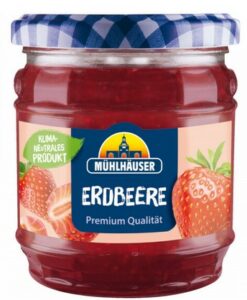
Nor did the accompanying advert, ‘MACHT NACHHALTIG EINDRUCK’ [MAKES A SUSTAINABLE IMPRESSION], break down why exactly the product was supposed to be sustainable:
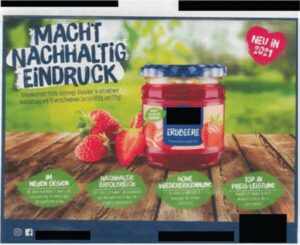
In the meantime, dm-drogerie markt GmbH + Co. KG advertised its liquid soap using the claims ‘climate-neutral’ and ‘CO2-offset’ on the packaging.
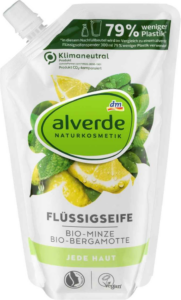
In addition, the logo and lettering of ClimatePartner Deutschland GmbH, which brokers climate protection projects, among other things, appeared as:

The text in smaller letters comprises the URL ‘ClimatePartner.com’, along with a project number. With this reference number, the ClimatePartner website can be accessed to ascertain how climate neutrality is to be achieved for that product. One of the projects referred to on the website was a forest protection project in Peru that had been validated under the REDD+ (Reducing Emissions from Deforestation and Degradation) mechanism, which was launched by REDD+ and the Verified Carbon Standard (VCS).
A dishwashing detergent by dm drogerie-markt also contained the term ‘environmentally neutral’ on its label, with a further explanation of this status on the packaging:
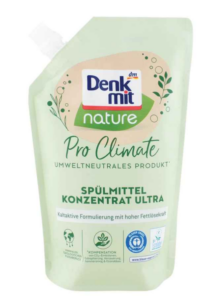
This informed the potential purchaser that the environmental costs would be offset in five impact categories, namely CO₂ emissions, eutrophication (i.e. excessive nutrient inputs), acidification, summer smog and ozone depletion. Here, too, the company assumed that a forest protection project would ensure the necessary environmental neutrality.
Other dm drogerie-markt products, on the other hand, contained the ClimatePartner logo with the project number after the ClimatePartner name and the statement ‘climate-neutral’:
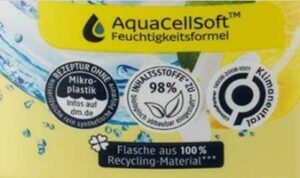
According to the Regional Court of Karlsruhe, dm drogerie-markt has now stopped advertising and terminated its collaboration with ClimatePartner.
All of the above-mentioned means of advertising in the respective markets have so far been prohibited by the courts. Why is this?
Legal basis
In 2021, the Federal Constitutional Court [BVerfG] ordered the state to put in place provision to enable climate neutrality to be achieved. However, protection of the fundamental rights of the individual must also be taken into account. The transition to climate neutrality needs to therefore take place in a timely manner and the appropriate incentives and conditions must be put in place to achieve this.
One of these conditions involves the prohibition in law of misleading by omission. The Unfair Competition Act stipulates that consumers must not be deprived of the essential information they need to make a decision to purchase. This essential information includes how ‘climate neutrality’ and ‘environmental neutrality’ have been achieved, where this has been claimed. Consumers should be able to verify that a product is truly ‘climate neutral’ or ‘environmentally neutral’ before purchasing it.
In preparing the future Green Claims Directive, the Commission of the European Union has also noted that consumers attach particular importance to the environmental friendliness of products and are also prepared to pay more for such products. One of the goals of the Green Claims Directive is therefore to give environmentally friendly products a competitive advantage by requiring them to provide comprehensive information to prospective consumers in order to promote sustainability in the European Union.
Withholding essential information
According to some higher courts, consumers understand the term ‘climate-neutral’ to mean ‘CO2-neutral’. However, the Regional Court Karlsruhe rightly pointed out that it is well understood that CO2 emissions are not the only substances that are harmful to the climate. The consumer therefore understands the term ‘climate-neutral’ to mean achieving a greenhouse gas balance, or a balanced environment. The bottom line should be that there is no (negative) impact on the environment as a result of the product.
If there is no clarification of the background facts to these terms, this constitutes a case of inadmissible misleading of the consumer.
This was the case with the simple claim of climate neutrality on the jam jar and in the accompanying advertisement, without any further substantiating information on the label. The advertisement was prohibited by the Higher Regional Court of Düsseldorf.
Among other things, the liquid soap was labelled ‘CO2-offset’. However, this is also simply a claim, and requires further clarifying details.
In the case of the dishwashing liquid, five categories of environmental neutrality were listed, namely CO2 emissions, eutrophication [excessive nutrient input], acidification, summer smog and ozone depletion. Admittedly, these are the ‘big five’ contributors to environmental pollution. However, the Regional Court of Karlsruhe objected to the fact that eight out of the 13 environmental impact categories were not taken into account, and hence this meant environmental neutrality could not be claimed.
In addition, the detergent has negative environmental impacts at all stages of its life cycle, which need to be reduced and compensated for. However, the consumer understands the term ‘environmentally neutral’ to mean that there should be no residual environmental impact. The mere compensation for some, but not all, harmful environmental effects is therefore insufficient to justify the ‘environmental neutrality’ of the product.
How should information be provided?
German law recognises that comprehensive information cannot be provided in an advertisement or on a label due to the small area in question or time allowed, as well as the complexity of climate processes. Therefore, clearly visible references to sources of information that are easily accessible to the consumer when making a purchasing decision are permissible. In the opinion of the Higher Regional Court of Düsseldorf, for example, the reference ‘For further information, see …’ with the indication of an Internet address, is permissible. A QR code (quick response code), as the name suggests, also allows information to be provided quickly.
These criteria were not met in the case of the illustration of ClimatePartner’s logo, which appeared with the name ‘ClimatePartner’ and a project number:
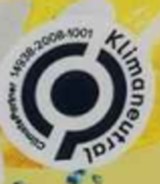
However, in the case of the reference to the ClimatePartner website on the liquid soap, the website URL that led to the relevant information was an acceptable form of information.

What specific information must be provided to consumers?
The courts have focused on the steps within the life cycle of a product to which the claim of climate or environmental neutrality refers, that is, whether certain (gaseous) emissions have been excluded from the calculation. It is important to know whether climate/environmental neutrality is (also) achieved through internal conservation measures, as well as the criteria that were used in the evaluation by the respective certification partner. The offset measures must therefore be described in concrete terms.
According to the Regional Court of Karlsruhe, reforestation and forest protection projects do not constitute sufficient compensation. This is because they do not permanently eliminate the greenhouse gas emissions associated with the product. According to the Higher Regional Court of Düsseldorf, the public would not assume that a company that describes itself or its product as ‘climate-neutral’ was relying solely on offsetting measures by third parties or the purchase of certificates. Trading certificates and other offsetting options alone would – at least from the consumer’s point of view – give rise to the suspicion that the company in question is merely engaging in so-called ‘greenwashing’ without actually improving climate protection to any significant extent.
If the background facts fall short of the message implied by the advertising claim, this can be relativised by more detailed explanations. However, the Regional Court of Karlsruhe also stated that relativisation cannot succeed if the consumer’s misconception is simply reinforced by the explanations provided.
Not legally binding
As far as can be seen, the judgments reported here are not finally legally binding. The Düsseldorf Higher Regional Court has allowed an appeal to the Federal Court of Justice. It therefore remains to be seen how the courts will deal with the Federal Constitutional Court’s argument that fundamental rights must also be taken into account in the requirements to achieve climate neutrality.
Higer Regional Court Düsseldorf, judgment of 06.07.2023 – 20 U 72/22
Regional Court Karlsruhe, judgment of 26.07.2023 – 13 O 46/22 KfH
Learnings: When using environmental claims to advertise your products, pay attention to how the consumer might interpret the claims. The claims must be true according to the consumer’s understanding of them. It is a well-known and recognised theory in psychology that once a misconception has been created, a greater effort in terms of explanation is required to correct the misconception than the effort required to make the correct representation in the first place. Such information can be made available to the consumer via a website. However, clearly visible references to these sources must be made on the packaging. For example, such information can be easily accessed through a QR code.